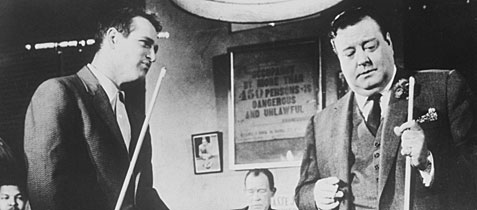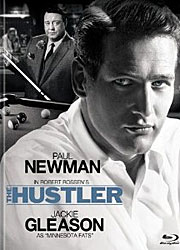- Rated NR
- Drama
- 1961
- Buy the Blu-ray
All photos © 20th Century Fox
Reviewed by Bob Westal
()
don't like to say that this or that film classic is "as fresh as the day it was made," as if movies had enjoy-by dates printed on them, but there's something about "The Hustler” that really does feel like it could have been made yesterday. Its lack of early ‘60s coyness about sex and love, addiction, and thuggish violence might have something to do with that. Its biting attitude towards the matter of winners and losers, success and failure, and money and the lack of it also feels contemporary to our own Great Recession era. Even if none of that was true, however, this extremely dark and entertaining drama would still be a masterwork.
Paul Newman arguably became the first true superstar of the post-classic era as "Fast Eddie" Felsen, a hugely skilled and ambitious pool player who makes a precarious living by betting and suckering players unaware of his abilities. For Eddie, however, the real job is to make it to the top of the game by defeating the best player around, Minnesota Fats (Jackie Gleason). A disastrous attempt at humiliating the older man winds up with a broke and self-defeated Eddie parting with his trusted mentor and business partner, Charlie (Myron McCormick).
Briefly living out of a bus station, Eddie meets and moves in with Sarah Packard (Piper Laurie), a damaged alcoholic and part-time student. The love affair offers some hope of redemption for the both of them, but Eddie is unable to commit to anything not involving propelled spheres and a table. Because he has few other choices, the pool hustler does commit to his new "stakehorse," Bert Gordon (George C. Scott), a velvet crocodile of a gambler who enjoys tearing down Eddie as a "loser" even as he happily takes 75 percent of his winnings. Bert proves to be an even worse boss than you think when Sarah joins the boys on a nightmarish trip to fleece errant gamblers during the Kentucky Derby. Nevertheless, a second battle with the unflappable Minnesota Fats is inevitable, but the real struggle is between Eddie's boundless ambition and the need for one thing Bert tells him over and over that he lacks: "character."
"The Hustler" was shot in New York City by Robert Rossen, the writer-director of the Academy Award-winning 1949 version of "All the King's Men" and a former Communist Party member who had, like Elia Kazan, buckled under to McCarthyism and named numerous names. His director of photography was German emigre Eugen Shuftan, a hugely important in-camera effects innovator on Fritz Lang's "Metropolis," whose prior film had been Georges Franju's unspeakably beautiful 1960 horror masterpiece, "Eyes Without a Face." Based on a well-regarded novel by Walter Tevis, "The Hustler" is the first really successful American film I know of that I'm sure was directly influenced by the European New Wave – it's easy to imagine Francois Truffaut making a very similar film. Part of that Euro influence is that "The Hustler" is a bit long and leisurely in its pacing, but necessarily so. We're going on a journey with Eddie Felsen, and we need all 134 minutes to get there.

To say that the whole thing is anchored by a strong performance by Paul Newman is begging to be accused of a vast understatement. That's fine, because Newman's genius was his lack of apparent fussiness and the avoidance of the kind of emotional pyrotechnics and showy effects sometimes practiced by contemporaries like Marlon Brando and James Dean. Newman was the Method's own Spencer Tracy. When he shows us Eddy being cruel and callous, or discusses the feelings of elation he experiences when his game is at its best, we understand that this is all coming from the same person who is working hard to hide his feelings, not show them. We see the worst of Eddie, but we don't make too much of the best of Eddie.
The rest of the cast is equally on top of their roles. Piper Laurie may be best known today for playing a pair of rather strange and unpleasant women in Brian De Palma's version of "Carrie" and David Lynch's "Twin Peaks," but her work as the self-loathing alcoholic who is also the moral center of "The Hustler" is lucid and heartbreaking. When we see a tear coming down her face as Eddie cruelly tells Charlie, his former mentor, that he wants nothing more to do with him, we instantly grasp what she must be feeling: fear of eventually losing Eddie, self-pity, and compassion for the older man.
George C. Scott, still something of a new face but already a great ham in the best and most joyful sense of the word, gives a performance that matches anything in the great actor's career, "Dr. Strangelove" and "Patton" included. Bert Gordon is, of course, an innately mean and pathetic person who needs to tear down those around him to make himself feel important, but it's his constant manipulative statements to Eddie about "character" – a quality he entirely lacks but is able to judge in others – that ironically makes him the teacher from whom Eddie will learn the most, though at a huge cost.
Audiences who knew Jackie Gleason primarily as an expansive TV variety host and the lovably obstreperous bus driver Ralph Kramden must have been thrilled to see his portrayal of the inscrutable but admirable Minnesota Fats. A masterpiece of minimalist acting, watching Gleason perform his relatively brief but crucial role is a little bit like listening to a Count Basie piano solo – he plays few notes but they are immaculately chosen. When Eddie approaches him for one last game, Fats' response, "That's good, Eddie," says it all. He knows his odds are worse now, but he's pleased to be getting his younger rival's best game. As Eddie himself tells Fats, he's beautiful, and so is "The Hustler."
Single-Disc Blu-ray Review:
Yes, "The Hustler" looks crisper and more gorgeous than ever on Blu-ray, and the new 5.1 HD stereo remix of the original mono soundtrack makes the most of Kenyon Hopkins jazzy score. Also, the whole thing is packaged in a nice little hardcover book with brief biographies of the cast. As for the extras, whether you're spending too much time perfecting your craft and need a break, or are lazily looking for an excuse to not perfect it, this 50th Anniversary Edition offers plenty of material to keep your cue idle. For starters, we have three brand-new documentaries focusing on Paul Newman, Jackie Gleason and, most interestingly, Walter Tevis, author of the original novel, as well as “The Man Who Fell to Earth.” A bit more "warts and all" than the other two featurettes, the Tevis profile makes it pretty clear that the moral struggles endured by Eddie Felsen and Sarah Packard were very much inspired by Tevis's real-life demons.
There is also a 2007 commentary track featuring Newman, Piper Laurie, and critic Richard Schickel among many others. That's not all, because there are seven additional features left over from past DVD editions. They're all worth a look, but many are of special interest to pool players. Especially enjoyable for the rest of us is an early 2000's edition of A&E's "Biography" made in conjunction with Paul Newman's final major onscreen role in "Road to Perdition." It features lengthy interviews with Newman and his wife, Joanne Woodward. While it is unabashedly angled towards the bright side of Newman's sometimes difficult and tragic life, it's an affecting reminder of why the hard-working, fun-loving, and socially conscious/charitably-minded actor, racecar driver, activist, and manufacturer of extremely good salad dressing, pasta sauce, and popcorn, was one the most universally loved and respected public figures of his time.
You can follow us on Twitter and Facebook for content updates. Also, sign up for our email list for weekly updates and check us out on Google+ as well.












